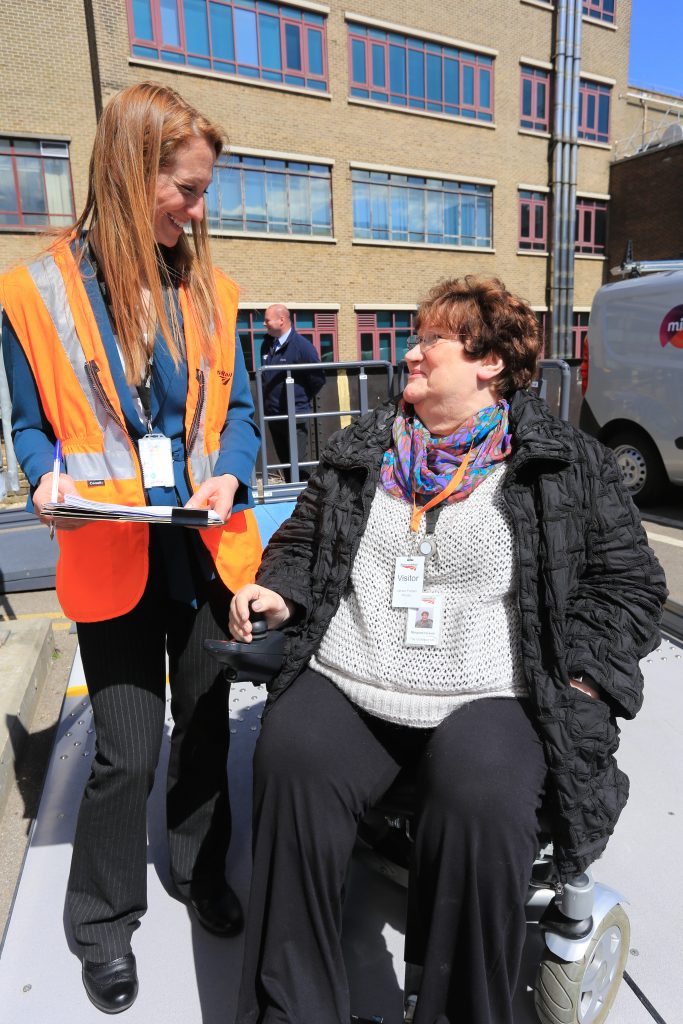We pay tribute to former colleague Margaret Hickish MBE, who was recognised for her influence and outstanding achievements in developing disabled access on the railway and at the London 2012 Summer Olympics.
Margaret passed away on Tuesday 26 January. In 2013, Margaret joined our Diversity and Inclusion team and spent six successful years as the access and inclusion manager before leaving the company in 2019.
In her role, Margaret developed and championed principles of inclusive design – helping to make our depots, offices, stations and infrastructure more accessible for all.
Margaret led the way in developing our inclusive design policy and principles, as well as playing a significant part in developing the diversity impact assessment processes.
She also introduced our built environment accessibility panel, an independent resource made up of disabled people, some of whom were access consultants. The panel was set up to advise and challenge projects on accessibility.
To date, the panel has advised more than 250 major railway projects and schemes, with the group now meeting every three weeks due to increasing demand for such expertise. The panel is part of the formal processes required by the Department for Transport, in terms of signing off plans.
Honourable service
In 2015, Margaret was awarded an MBE in the New Year’s Honours list for services to disabled people.
A wheelchair user herself, Margaret has worked in the field of inclusive design for more than 20 years, making a difference for tens of thousands of disabled people.
Margaret said in 2015: “I am delighted to be recognised in this way, however the award belongs as much to all those colleagues and consultation groups’ members I have worked with to improve the understanding and delivery of inclusive design.”
Among her achievements before joining us was responsibility for the highly acclaimed Accessibility and Inclusive Design of the Olympic Park and Venues in 2012 – hailed the most inclusive and accessible in the Games’ history.

Margaret led the way in helping establish the inclusive design standards and strategy for the Games. This meant each and every venue and facility was created considering all aspects of its use by all competitors and by those spectators who either had a disability themselves or spoke English as a second language. This had a substantial impact on the success of the Olympic and Paralympic Games as the most inclusive and accessible Games ever.
Margaret made the concept of creating accessible facilities easy to understand for all those delivering the Games, and worked with the architects and designers early in the process so they built adaptability and accessibility into the design and use of buildings at an early stage, helped by her engineering background.
She even went above and beyond her role to inspire panels of disabled people to get involved themselves; commenting on and testing the designs and materials, holding the ODA to account for the breadth of usage of the buildings and generally acting as critical friends for the Games as a whole.
Loraine Martins, director of Diversity and Inclusion at Network Rail, said: “I worked with Margaret on the construction of the Queen Elizabeth Olympic Park, and knew that her expertise would be invaluable to us here at Network Rail. Margaret’s influence has been far reaching. From the DfT’s inclusive transport strategy published a couple of years ago, to our work with the Office of Rail and Road on the new accessible travel policy, right through to how we introduce reasonable adjustments for our disabled colleagues – Margaret’s mark is engrained in our approaches.
“I’m forever indebted to Margaret who shaped my approach to disability and accessibility, and whilst I miss her dearly, I’m also heartened in the knowledge that we continue to work hard to sustain and build on the changes which are part of Margaret’s lasting legacy.
‘Much-loved’
Margaret was a regular passenger through London Euston station. Joe Hendry, station manager, said: “Margaret was many things to the team at Euston. She was firstly a great colleague who always offered her help to make our mobility service better at Euston, she even spent some time working in the reception to understand our challenges.
“She was also a much loved passenger travelling through Euston with a cheery wave and hello to us all when she went through. She was also a friend to the team – supportive, caring and, importantly, shared her unique sense of humour with us. Well will miss her.”
‘She helped so many people’
Jonathan Payne, programme and frameworks manager, Diversity and Inclusion at Network Rail, worked closely with Margaret. He said: “I personally learnt so much whilst working with Margaret during my first two years in this role on a variety of projects.
“Being able to travel the country with her on trains was invaluable. Getting to see accessibility through her eyes as a wheelchair user provided an understanding of many of the challenges our disabled passengers face. She was tenacious with a real drive to ensure we not only reached the required standards on accessibility but we should strive to far exceed them.
“Margaret also did a lot to improve the quality and reliability of passenger assist through training courses and mentoring of our station colleagues who provide assistance to our older and disabled passengers. The railway infrastructure we have today is more accessible because of Margaret’s work, as will be future enhancements.”
Influential
In 2014, Margaret was voted the most influential disabled woman and third most influential disabled person by the Disability News Service in the category of Equality, Consultancy and Access. She was also included in the Power 100 List 2015 of people with a disability or impairment.




